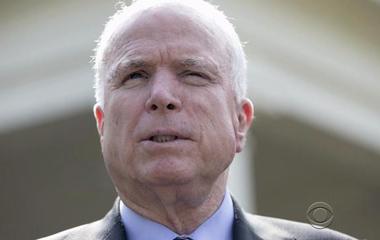 Sen. John McCain is returning home to Arizona to begin radiation and chemotherapy treatment, following his decisive vote to block his party’s attempt to repeal parts of Obamacare.
Sen. John McCain is returning home to Arizona to begin radiation and chemotherapy treatment, following his decisive vote to block his party’s attempt to repeal parts of Obamacare.
The Arizona Republican will begin the treatment Monday at the Mayo Center in Phoenix, but keep his work schedule and plans to return after August recess, according to a Friday statement from his office. The 80-year-old senator was diagnosed with glioblastoma, an aggressive form of brain cancer, after doctors performed surgery on a blood clot above his left eye.
McCain’s vote was critical in Republican’s failure to pass a “skinny repeal” of Obamacare, as the bill failed by one vote in the 1 a.m. hour on Friday. McCain was one of only three GOP senators to vote against the measure — the others were Sen. Lisa Murkowski of Alaska and Sen. Susan Collins of Maine.
When reporters asked why he cast a “no” vote, McCain’s response was simple: “I thought it was the right thing to do.”
A few hours after the middle-of-the-night vote, McCain was back to work in his office.
The prognosis for the type of cancer McCain has is grim, CBS News medical contributor Dr. David Angus told “CBS This Morning” last week.
“Glioblastoma is the most aggressive form of brain cancer,” Angus said. “Most people live about 14 and a half months.”
Support for Sen. John McCain pours in after brain cancer diagnosis
Colleagues on both sides of the aisle offered their overwhelming support of McCain after his diagnosis. McCain is seen as somewhat of an institution in the Senate, having arrived in 1987 in a different era of politics.
In a resounding speech on the Senate floor upon his return after the diagnosis last week, he urged his colleagues to work across the aisle and return to regular order in the Senate, arguably, something he did with his vote early Friday.
“What have we to lose by trying to work together to find those solutions? We’re not getting much done apart,” McCain said in his Senate floor speech last week. “I don’t think any of us feels very proud of our incapacity. Merely preventing your political opponents from doing what they want isn’t the most inspiring work. There’s greater satisfaction in respecting our differences, but not letting them prevent agreements that don’t require abandonment of core principles, agreements made in good faith that help improve lives and protect the American people.”
[“Source-cbsnews”]
